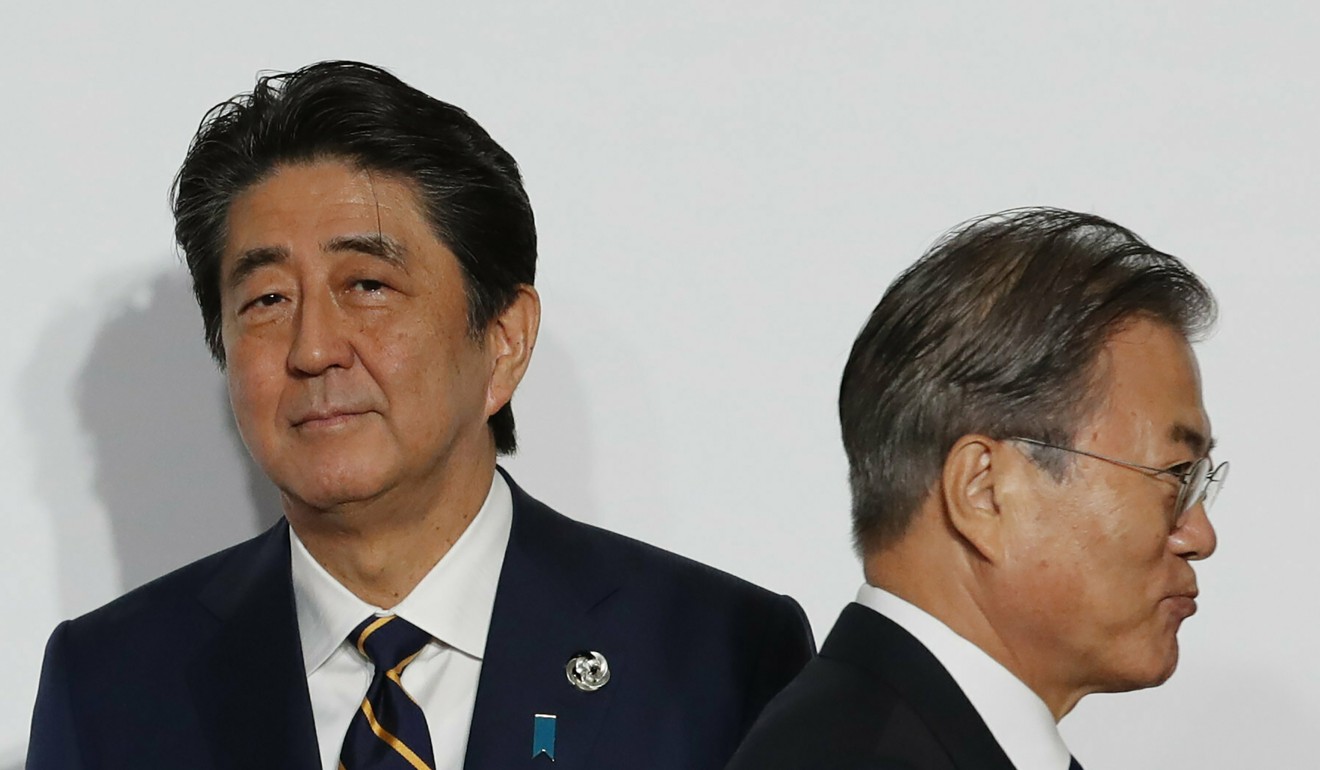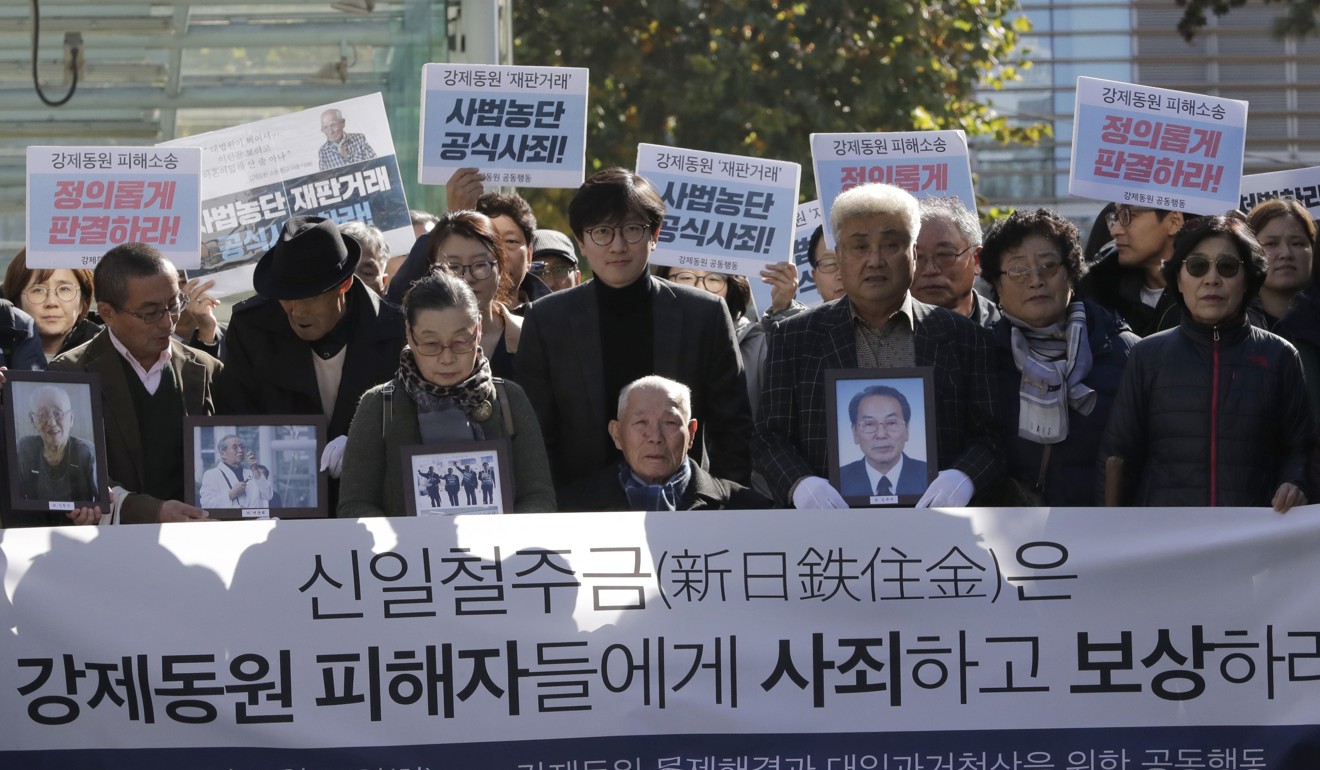Japan and South Korea are at odds, but the US won’t get involved. Is it because of Kim Jong-un?
- As a dispute over Korean forced labourers spirals into a burgeoning trade war between Tokyo and Seoul, Washington is reluctant to step in
- Analysts say part of the reason is that Pyongyang, the strongest argument for cooperation between Tokyo and Seoul, is seen to have receded as a threat

When Japanese Prime Minister Shinzo Abe and then South Korean president Park Geun-hye first met in 2014, more than a year after they had entered office, it wasn’t at the suggestion of either leader. It was the idea of Barack Obama, president at the time of their mutual ally the United States.
At the Nuclear Security Summit in The Hague that March, Obama brought together the two leaders, bitterly at odds over historical and territorial disputes, to discuss the common challenge of nuclear-armed North Korea, continuing efforts by successive US administrations to boost trilateral cooperation on regional security.
But as tensions flare once again between Tokyo and Seoul, the result of a dispute over Korean forced labourers that has rapidly spiralled into a burgeoning trade war, expectations of Washington stepping up to get the neighbours back on good terms are much lower than before.
US President Donald Trump’s antipathy for traditional alliances, North Korea’s improved relations with the US and South Korea, and reluctance within US diplomatic circles to take sides among allies all foreshadow a hands-off approach from Washington, analysts said.
“I don’t believe Trump really sees much value in these alliances, so I don’t think he’s prepared to spend any of his political capital getting them to work on these issues,” said Brad Glosserman, deputy director of the Centre for Rule Making Strategies at Tama University in Tokyo. “That requires an understanding of detail, nuance, and strategic interest that this president just doesn’t seem much interested in either acquiring or mastering.”
Washington’s foreign policy establishment has long dreamed of a three-way alliance between the US and treaty allies South Korea and Japan, both of which host key US military bases, to present a united front against the North and an increasingly assertive China.
In Tokyo and Seoul, however, a raft of outstanding historical and territorial issues, stemming from Japan’s colonisation of the Korean peninsula from 1910 to 1945, have been constant roadblocks to closer cooperation.
Shin Kak-soo, a former South Korean ambassador to Japan, said three-way cooperation was needed more than ever given the “fluid and unpredictable strategic environment in Northeast Asia that stems from the North Korean nuclear threat as well as China’s rise”.
“The reinforced northern triangular relations among North Korea, China and Russia are making the southern trilateral relations among South Korea, the US and Japan look pale in a conspicuous way,” Shin said.
The latest rift between South Korea and Japan blew up last week after Tokyo began restricting exports of key materials used in South Korean smartphone chips and displays, in retaliation against a South Korean court ruling that ordered Japan’s Nippon Steel to compensate South Koreans forced to work during the colonial period.
Tokyo argues that claims arising from its rule were settled in 1965 under a treaty that normalised relations between the sides and provided Seoul with about US$800 million in economic aid and loans. South Korean President Moon Jae-in, who has chided Japan for not taking a “more humble” attitude to its past, has insisted that the decisions of the judiciary must be respected.
In recent days, politicians in both countries have further ramped up tensions, accusing the other side of shipping illicit materials to North Korea for use in their chemical weapons programmes.

Adding fuel to the fire was a Thursday report by South Korean media that the United Nations Command, the US-led international military force tasked with defending the South in the event of a conflict on the peninsula, was considering adding Japan to its membership – a move that would inflame bitter memories of Japanese colonisation among Koreans. The UN Command categorically denied the report, calling it “flagrantly false”.
South Korean officials have embarked on a flurry of diplomatic activity in recent days to win US backing in the spat. South Korean Foreign Minister Kang Kyung-wha on Wednesday told US Secretary of State Mike Pompeo that Japan’s retaliatory moves on trade could end up hurting US firms.
Kim Hee-sang, a senior official at Seoul’s foreign ministry, has also met with US State Department officials in Washington, while South Korean Trade Minister Yoo Myung-hee is due to visit the US next week.
Kim Hyun-chong, deputy chief of the South Korean presidential National Security Office, said on a Friday visit to Washington that the US was willing to hold three-way talks to resolve the spat, but Tokyo had yet to respond.
State Department spokeswoman Morgan Ortagus on Friday said the US was willing to “do everything we can to pursue ways to strengthen our relationships between and among all three countries both publicly and behind the scenes”.
Ortagus did not directly address the tensions between the sides or the possibility of three-way talks.
Assistant Secretary of State for East Asian and Pacific Affairs David Stilwell arrived in Tokyo on Thursday, ahead of a scheduled visit to South Korea on July 17.
Any engagement by the Trump administration is likely to be limited and low-key, according to analysts, despite Seoul’s apparent desire for US intervention.

“The reticence of the Trump administration to intervene on South Korea’s side reflects the US’ position of not wanting to alienate Japan, its most important alliance partner within the region,” said Stephen Nagy, a senior associate professor specialising in international relations at International Christian University in Tokyo.
“Equally important, though, is that the US has used similar tactics on its counterparts, so criticising Japan would in effect leave the Trump administration open to criticism.”
The US has used similar tactics on its counterparts, so criticising Japan would in effect leave the Trump administration open to criticism
Meanwhile, North Korea, traditionally the strongest argument for cooperation between Tokyo and Seoul, has receded into the background as a threat as Trump and Moon pursue diplomacy and rapprochement with strongman leader Kim Jong-un.
“If you don’t believe that North Korea is really a threat any more, then why would you necessarily care?” said Glosserman from the Centre for Rule Making Strategies. “In other words, the cooperation between Japan and South Korea is in theory designed to increase the capacity of both of those countries and the US to defend or deter against a North Korean threat.”
He said it was difficult to see an end to the impasse in the short term unless Pyongyang made a move so provocative it forced the sides into working together in earnest.
“Once Seoul demonstrates sincerely its interest and commitment to US-Japan-South Korea cooperation, the two democracies can come up with a face-saving exit,” said Nam Chang-hee, a professor of political science at Inha University in Incheon, South Korea. “But at the moment Seoul appears too much preoccupied with mediating between and bringing together Pyongyang and Washington to seriously take care of Seoul-Tokyo ties.”